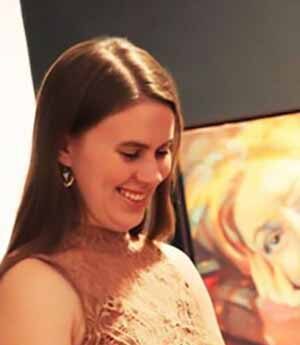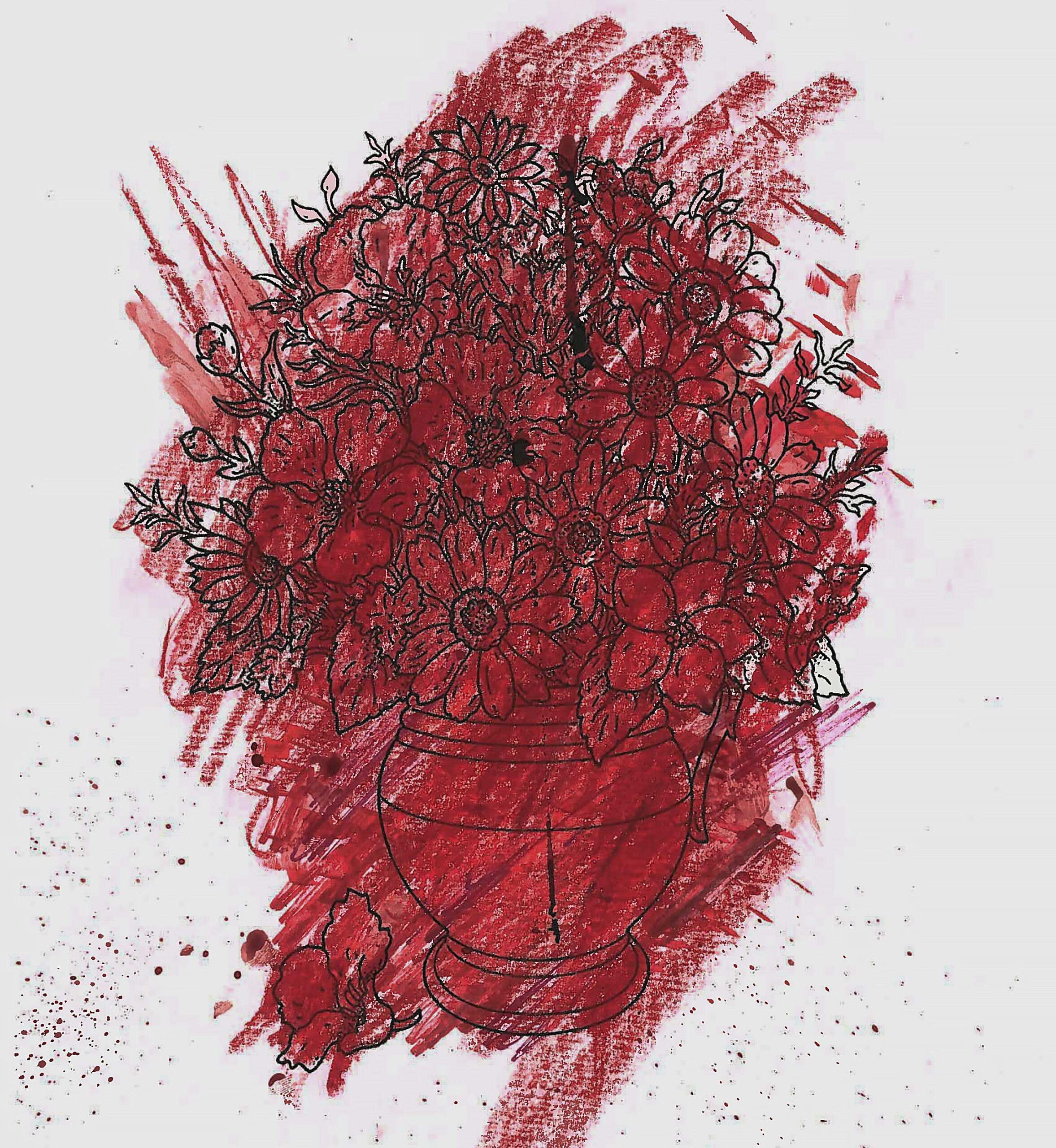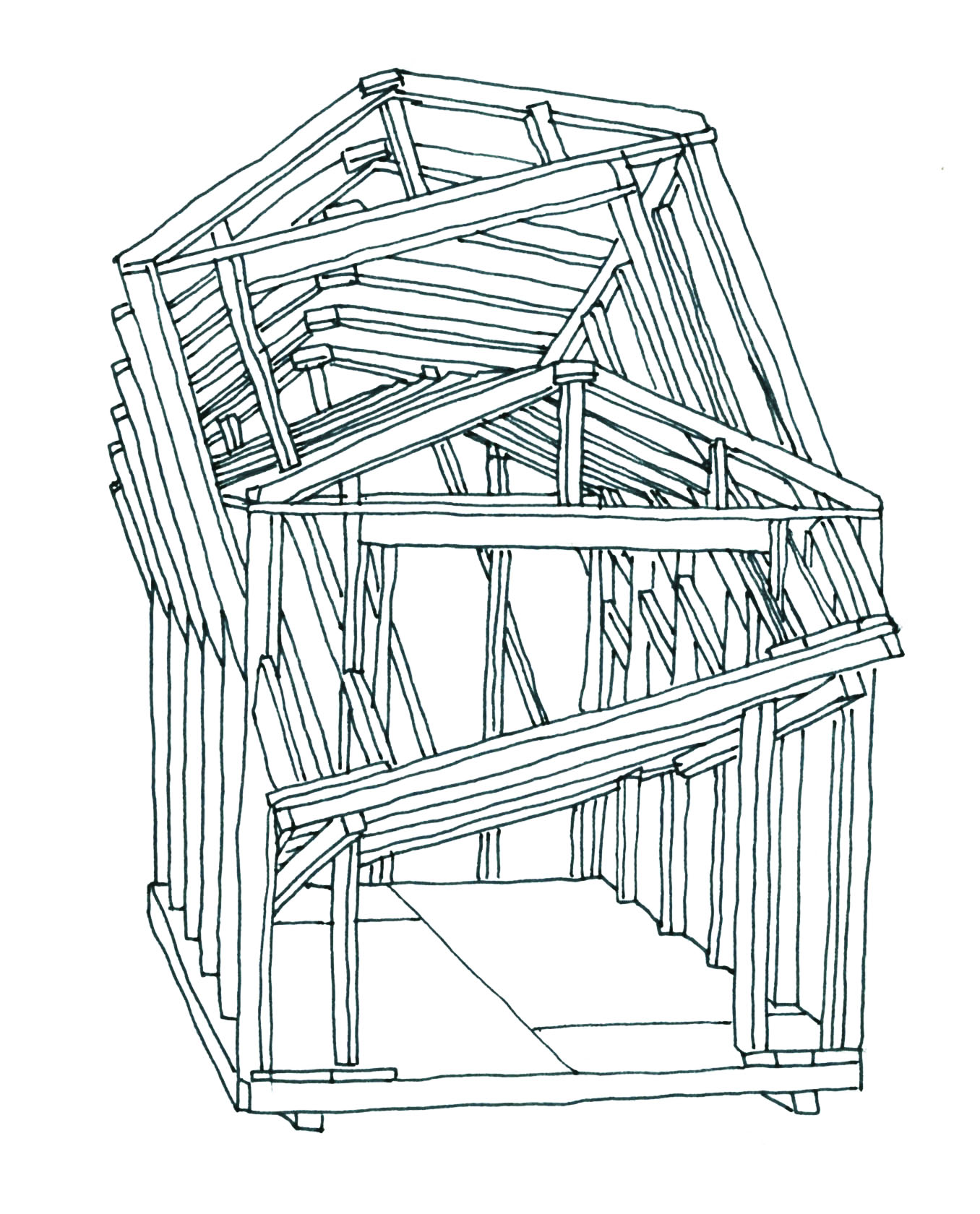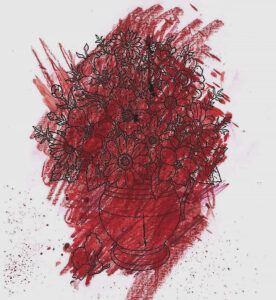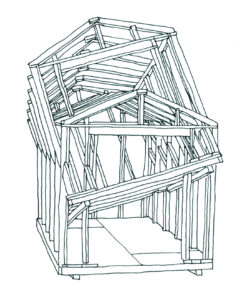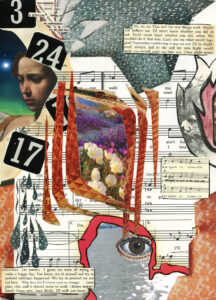Cinderella
by Sarah Harshbarger
Patrick dragged two buckets of scarves and glitter wands to center stage. “As promised,” he said, “I brought the magic.” This was a momentous occasion, the last scene we needed to block—Cinderella’s big change into her ballgown. We had all seen the dress hanging backstage, light peach and decked with rhinestones, corset tied with a large satin bow. Now it was in the arms of a stagehand, waiting just behind the curtain. In its presence, the show was starting to seem real, everyone whispering and bouncing in their ballet flats.
The woodland creatures waited in a semicircle while the older kids, the bourgeoisie in their dresses and coattails, sat in the audience, whispering, texting, using each other’s shoulder pads as pillows. “Mice and birds,” he said, looking in my direction, “you’ll take something from here, and run around Cinderella.” He pulled out a magenta string of pom-poms and circled Hope, shimmying the garland between his outstretched arms, leaping like a marionette. Hope was seventeen and far away. The day I first saw her, I thought she looked like a girl you’d have a statue of in your garden, the way she twisted her waist-length hair, clutching a blank steno pad.
We dove into the buckets, digging through mounds of plastic props and feather boas. I was a mouse, trying to work my way in. We were the youngest, reaching and stretching with skinny arms while the older girls, the birds, swooped in from above and extracted the biggest scarves, draping them around their shoulders to make wings. I found a long glittering shawl and laid it over my binder-clipped script, which I was not supposed to be using. Today was the first dress rehearsal, the day Patrick marked on the calendar EVERYONE OFF BOOK, but I was hoping he’d forgotten about that.
“Here, let’s try it.” Patrick returned to his seat and looked at Hope, linking his fingers behind his head. “You ready, princess?”
The fairy godmother stepped up and cleared her throat, bouncing her gold hair. Patrick gave her a thumbs up. “Bibbity—bobbity—boo!” We began revolving. A pair of birds brought the ballgown from stage left, and as they hovered, we tossed things up and chattered. We whipped each other in the faces with scarves, twirled ourselves up in cuts of velvet, laughed as we tripped over ourselves.
Hope took the hem of her cotton skirt in her hands. “You want me to change now?” she asked.
“Yes, now!” Patrick called back. “Bibbity bobbity boo, let’s go!”
“I just—is this really going to hide anything?” She looked around at the animals, still spinning past her with scraps of fabric waving.
“They’re not a stupid audience, Hope,” Patrick said. “They don’t actually think your dreams are dressing you.” He trotted up the stairs and we scattered, collecting our props. Somehow the girl behind me had ended up with my shawl, and I had her beaded scarf.
Patrick stood center stage, facing his star. “All I need you to do is throw your dress off and put your arms up.” He extended his own arms in demonstration, stretching up on his toes, then sinking to her height again. “The stagehands will do the rest. It’ll look good with the lighting, okay?” He dropped his stage voice and spoke just to her: “Can you do that for me?”
Hope nodded. “Good,” said Patrick. “Here.” He unbuttoned something behind her neck, smoothed it. “Let’s try it one more time.”
*
Behind the stage was the church kitchen. There were two black curtains hung in the open doorways. Here we would wait for our cues, whispering and playing cards, changing each other’s hairbows, and eventually settling into boredom and our own corners. That day the older kids made sure their mics weren’t on and swapped stories about their teachers. I sat in the back beside the ice chest where it was cool, playing with the safety pins holding my costume up by the shoulders, staring at my pre-algebra homework, listening in.
Between scenes, I felt a thud beside me and looked up to find Hope, sweating with her face pressed against the ice chest. “You don’t mind, do you?” she asked. “Oh, this feels good.” Her cheeks were round and red, and her face showed the smudges of a thick, dark eyeliner she must have wiped off for rehearsal. Her long hair was in a single braid, frazzled from the hairband down. The peach tulle I had been admiring so long was laying across my lap. Then she gathered it up. “Sorry. This is so bulky. And itchy.”
“It’s pretty, though,” I said.
“It’s pretty,” she agreed. “I like your costume, too. It’s sweet.”
I looked at my own flat chest bunched with cotton balls and pom-poms fixed to a solid gray leotard. Unlike the other mice, who had ears made of paper or bought from Walmart, my ears were cut out of real leather, one of my mother’s couch samples she kept in a cookie jar on top of a cabinet, years after choosing the couch. “We have a lot of stuff around the house,” I said.
“You’re adorable, you know that?” She tucked her tulle underneath her. No one here had ever called me adorable—even though I was one of the mice, I was the oldest, and the lankiest. Adorable was for the bumbling fourth-graders that flashed their Hanes underwear in the dressing rooms as they wriggled into their tailed sweatpants.
One of the stagehands, a high school girl with a rose tattoo on her neck, came in with the cards. Patrick wrote notes for all of us on index cards, ways we could all improve, if we could read his handwriting. She handed me mine. Anna, it said. Lose the book.
I stared into Patrick’s messy writing until Hope nudged me, nodding at it. “Don’t worry about it. He gave us, like, no time to get off book. He just likes to be menacing.” She pushed herself up and went to listen at the curtain, adjusting her skirt.
I folded the note and tucked it inside my math book, my cheeks burning. I had tried. During the school days I would set the script aside and mutter my lines into the bathroom mirror, and I could get them all in a row, looking into my own eyes as I recited, the ball! the prince! that cat! But every time I tried to leave the thing backstage, I only made it to the curtains before I ran back to check a word or cue.
From the ice chest, I watched Hope nodding along with her ear pressed to the curtain. “Did you know this is her first play?” the tattooed girl asked me.
I shook my head. I had assumed Hope was one of the six-year returners, maybe even one of the few who’d been around since the last time the troupe did Cinderella. It was my first play, too. I had been sent to the audition by my seventh-grade music teacher after I told her I did not, under any circumstances, want her to call the school counselor on me.
The tattooed girl continued, “I’ve been here four years, didn’t even get a callback. But I guess I should be used to it by now. Wonder where he found her. A concert this time? A family cookout?”
Hope came back from the curtain to take her card, and the tattooed girl handed it to her with raised eyebrows. Hope didn’t show me what it said, just sat, fidgeting.
“I can hardly breathe in this corset,” she said. She reached in the freezer and pulled out a handful of ice, and she stuffed it down her dress into her strapless bra. She ran her frozen fingers through the roots of her hair, wetting it down flat.
*
My house was a flea market where nothing got sold, and a dump where nothing decomposed. When I came home from those late rehearsals it was to a living room full of my childhood dolls and my mother’s crumpled Arby’s wrappers, a bedroom I had to step over boxes of old magazines to get into. Sometimes when I came inside I would step on a paper plate the dogs had brought to greet me, sticky with the remains of some microwaved meal.
My father worked from home, and at times he would live for weeks in an RV behind the house. Cinderella was one of those times. The RV had a tan and orange remote-controlled awning strung with chili pepper lights, always unplugged. He pretended staying out there was nothing unusual—maybe he really thought so. In the mornings he would come in the house, dutifully have his coffee at the kitchen table with his vanilla creamers, his Prozac. He would read his newspaper, his hair already combed and his face shaven. Then he would disappear to work, to his perfectly organized home-office-slash-spare-room, and he wouldn’t come back inside except to make grilled cheeses for dinner, or to bring us takeout. Some nights he slept there, too. When this happened, my mother would hit me with questions.
“How did your costume look?” she asked as we got home that night.
“It looked good,” I said. “Cinderella said it was ‘sweet.’”
“Well that’s a compliment,” she said. “What did you decide about the cotton tail?”
“Mice have long tails.”
“And pumpkins don’t turn into carriages. It’s a fairy-tale.”
“I don’t think so.”
“Well, whatever you say. There’s Chinese in the fridge. And I grabbed us some Cokes—they’ve got those new summer cans.”
I went downstairs and made myself a plate of leftovers, and then I went out to the trailer. My father had a phone tucked against his cheek, but when I came in, he put it down, like someone had hung up on him and he hadn’t remembered to hang up himself. “How was rehearsal?”
“It was good. Cinderella said my costume was ‘sweet.’”
“That’s good. Do you have much homework?”
“No. Just two chapters of Frankenstein, and I’ve read it before. Guess what, we’re getting shirts with all our names on them.”
“That’s great. I’ll look forward to seeing them.” He shuffled his papers around, flipped through a notepad with his thumb. “What else are you going to do tonight?”
“I have to work on my lines some more.”
“You should take a break. Maybe watch a movie.”
“I can’t. I’m behind. I got a notecard about it.”
“A notecard?”
“Patrick writes them. So we know what to work on.” I had told him this, of course. Just the other day I’d burst in thrilled that Patrick had written Stage presence—improving.
“Hmm. Well you’ve always been good at that, memorizing things. You’ll get them down.”
I looked around the trailer, the old plaid sleeping bag rolled up underneath the table, the bag of Styrofoam cups beside his MacBook. I remembered the last time we took a camping trip together, how we ate fish my dad pretended he had caught with his bare hands, how I sat my little camping chair right between their big ones so they couldn’t ignore me. I had been in the third grade. “I should go help put the groceries away,” I said.
He picked his phone up again and turned it on and off. “I just need to finish a couple calls,” he said, and swirled the notepad around with his pen. “Then I’ll be in.”
*
The stagehands passed around our makeup templates, printouts of blank faces like wailing white ghouls. I had been handed one with a face design drawn in by a stagehand, arrows telling me what to use from the communal makeup suitcase. “Foundation—full face. Eyeliner. Blush—bright circles. Mouse nose—clown makeup kit.” In the dressing room I leaned over the suitcase, picking at it when there was no one around. I didn’t know my foundation color. My mother had once given me a bag of her makeup “to try,” but all I had found inside was a couple of crusty, dried-out mascaras and sticky jars of lip gloss.
I slipped into the bathroom with a handful of bottles and locked myself in a stall with the picture—the mirrors were full of older girls in dresses, jaws hanging as they did their eyes. I sponged my face and neck with the foundation, tentatively pressed it onto my lips. I caked blush into both cheeks until I could feel the layers with my fingertips. Outside, the stepsisters and duchess were talking about something I didn’t understand.
“I’m just saying, you’re not the first.”
“What’s it matter?” Hope’s voice asked.
“Don’t take it that way. We just want you to be careful.”
“Well, who says I’m not? Nobody here knows me. No offense, but you don’t know me.”
There was a knock and Patrick said, “Is anyone changing?” I heard him come in anyway, take inventory of their new looks. I stepped out of the stall, but he was blocking the bathroom doorway, and I couldn’t see myself in the mirror.
“Okay,” he told the older girls, “Go line up on the stage. Carly and Deb will tell you what they think.” As he went to leave he saw me in the mirror. “What did you-all do to Anna?” he asked. “She looks like an Oompa Loompa.”
The girls smiled at me, sliding off the sinks and gathering their makeup cases. Patrick caught Hope by the shoulder and said, “Fix her, okay?”
Hope nodded and he left. “Come here, Anna,” she said. “No worries, I’ve been there. Every girl has.” She patted the edge of the sink and I hopped up. From the corner of my eye I could see that my face really was a burnt orange and, worse, the foundation stopped a half inch before my ears. I looked away, stared at the empty stalls. Hope took a handful of paper towels and ran them under her faucet. “We’re getting close to the show now. Are you excited?”
I nodded, too mortified to make conversation. She took my chin in one hand and scrubbed me with the paper towels with the other. “Don’t listen to Patrick. He’s so rude sometimes. I guess it’s a director thing.”
“That note he gave me,” I said. “I’m trying.” I couldn’t say it out loud. It would have been the same had he written Anna—Lose the pacifier.
“I know you are. You study your lines like it’s life or death, you know? All you need is confidence.”
“I know.” I thought of her script, how she sticky-noted every page she had lines on, which was nearly all of them. The way she tried to stay in character when she called for her forgotten lines, bouncing gracefully on her toes as she paused in her sweeping or dancing. I said, “If they were on a test, I’d know them all.”
She dabbed at my nose. “You know what I’ve noticed? You’re really mature. Not like some of these drama queens.”
“I’m just quiet,” I said.
She laughed. “Maybe that’s it. I like you, though. Here, close your eyes for me.” She took the eyeliner from the sink and pressed it hard, sharp against the base of my eyelashes.
When I opened my eyes and looked in the mirror, my hazel eyes stood out against my face like cheetah spots. She had outlined them in perfect, thick, black strokes, just like hers. I thought that mature was not quite the word. As she dug her lipstick into the corner of my mouth, she said, “Us new kids, we catch on fast enough, hmm?”
*
My music teacher, Mrs. Marshall, was a bumblebee, clumsy, round, and lovable, but always hovering. She was the kind of middle school teacher who should have taught kindergarten, with her Rubbermaid drawers of plastic prizes, her embarrassing acronyms for classroom procedures (“Remember the DART rule, everyone!”). She had thin dry hair that she kept in two ringlets over her shoulders, and on instrument test days she would wear vests with music notes on them. She was a sympathetic crier, and when I talked to her after school, sticky tears would gather under her eyes like little gems.
We first talked when I lost my leaf project for science class with the unforgiving Mr. Lee. It was a four-month assignment, a continuum of different types of leaves over the season, and it was most of the grade for the fourth quarter. Mine was bound in a scrapbook collaged with autumn-themed comics from the Baltimore Sun. One morning I left it on the kitchen table, and when I got home from school, it was gone. I searched all afternoon. My mother told me she hadn’t seen it, and after turning over a few decorative pillows, went to bed with a migraine. The next day I broke down in Mrs. Marshall’s class after several unsuccessful attempts to play “Linus & Lucy” on the piano. I told her about my leaf project, and she said it couldn’t possibly be that hard to find. Then I explained.
She told me she would be frustrated, too, if she were me, and that as a kid her father had been a trucker, hardly ever at home, and how she hated him for it. She told me to try not to blame my mother, and she gave me breathing exercises, which I refused to do. She said she would write my science teacher a note and try to get me an extension on the leaf project. And then, when she asked if I would consider talking with the guidance counselor, I sweated and scratched at my neck until she hummed and considered and pulled out a stack of pictures—Mockingbird Theater, ‘89 scrawled on the back of each one. Mrs. Marshall as a high school freshman, friends grabbing her cheeks, pretending to slice her across the stomach with swords. She had never forgotten them, she told me, as she handed me a printout of a corny monologue about the first day of school. Just try out.
The day after I became an Oompa Loompa, Mrs. Marshall caught me by the cafeteria trash cans.
“Nice job today,” she said. “‘Ode to Joy’ gets old, but you play it beautifully.”
“It’s fun to play,” I said. Behind us, I could hear a table of girls arguing over whether the eighth-grade science teacher was hot or creepy. A single tater tot flew through the air, followed by a loud squeal.
“You should come by this afternoon,” Mrs. Marshall said. “I could even write you a note, get you out of class a few minutes early. Catch up on how things are going?”
“I can’t,” I told her. Thinking fast, I added, “I have plans. Some of the cast is. . .”
“Sounds even better,” she said, beaming in her coral lipstick. “Have a good weekend, okay?” She buzzed away, and I went back to my table. I made up an excuse, told them she needed me to make up a quiz, but they were oily-haired boys shaving their carrots with plastic knives, and didn’t care. I turned to the blurry expiration date on my cottage cheese and thought of my lines, the way I read and reread them under the covers until I couldn’t see them anymore, until they were just letters in rows to me, like lines in a barcode.
*
My mother plopped a ball of string lights the size of a classroom globe into my arms. “Look what I found,” she said. “Aren’t they perfect? Tell Patrick he can borrow these. You can string them up around the stage—fairy-tale-ish, right?”
“Yeah, they’re good,” I said. My father was at the table, eating cornflakes on top of a phone book. He had the black cat lying over his arm, shackling him to the table. He observed us across the room.
“Do you want to run lines?” my mother asked.
“Sure,” I said. “Can I finish my homework first?”
“Yeah, yeah,” she said. “You want to come down and work with us? Your father is designing his business cards. I helped him pick out the font—I took a graphic design class in college.”
“I didn’t use your font,” my father said. “I used Baskerville.”
“What’s that?” my mother said.
“It’s the font I’m using.”
“Listen, you have to drive Anna to rehearsal tonight. Can you do that?”
“Yes, Lauren.”
“You have to get her there on time, okay? The theater doesn’t run on your schedule.”
“I said I would drive her, all right?”
“Don’t listen to him, Anna,” she said, stroking my father’s thinning hair. “Come down and work with us, we’ll all get along and bounce ideas off each other. Did I ever tell you about the time I wrote a chapter of a novel in eleven minutes?”
*
The stage was set for final dress rehearsal, and under full lighting, it looked ready for an interrogation. I bundled my borrowed makeup together and asked around for Hope. Prince Charming told me she might be backstage making sure her props were set.
I opened the curtain and found Patrick pulling tight the ribbons of Hope’s corset as she held the top of it to her breasts, sucking in her stomach. “Hi, Anna,” she squeezed out.
“Hi,” I said, and Patrick squeezed her together from both sides. “Can you help me with my makeup?”
“You’re going to have to ask someone else,” Patrick said. “The leads have a lot to prepare.”
Hope waved a white glove. “I’ll see you at intermission, okay?” she said. He tugged hard and she stumbled, nearly wobbling into his arms.
I asked one of the stagehands to help me and went to the bathroom to wait. I pulled my ears and tail out of my bookbag and put them on. Without makeup, my face looked blank and shapeless in the mirror. I rolled up my script in my hands and threw it in the trashcan before the door opened.
*
“So tell me,” Mrs. Marshall asked, “are you ready?” She beamed at me, swiveling in her rolling chair.
“I think so,” I said.
“What about the next one? Did you hear they’re doing The Secret Garden?”
“Yeah,” I said. “I’ve been thinking about it.”
I was wearing my new Cinderella shirt, and she spun me so she could read the names on the back. Her finger stopped halfway down the second column, where I had memorized my name’s place. “There you are,” she said. “Doesn’t it feel good?”
I looked down at the silhouetted carriage, trying to imagine finding the shirt still in my closet after years, wondering what I’d remember. “It feels great,” I told her. “Just like you said.”
“That’s wonderful,” Mrs. Marshall said. “That’s music to me, Anna. I can’t wait to see you perform.”
*
In the darkness of the overture, the quarters became closer, the floor stickier, the backstage sweatier. I felt the lines flicker off and back on in my head. I ran it through, counting scenes on my fingers. It was all there, but with nothing to check myself against, I was starting to believe I had memorized the wrong character, or the wrong show. My parents weren’t in the audience—my mother had said the next night for sure, just too many people on the first night, and my father was thinking the Sunday matinee—but Mrs. Marshall was out there, waiting to see me transformed.
In the first act I remembered all my lines. I turned out and projected. I didn’t run into any of the other mice. I remembered my plastic blocks of cheese when I went on, and didn’t drop them until it was time to drop them.
The change scene looked, under the lights, like a perfume commercial. Hope waved her arms and tilted her hips the way she had been trained, and the spotlights lifted from the ground to her beaming bright smile as she slipped through the dress like a diver into water. I watched her from underneath—her skirt flew straight over my head and when the glitter cleared, she was twirling in peach tulle. The circle of us seemed to follow the swish of her gown.
Hope joined me at the ice chest at intermission. “Good job,” she said. “Having fun?” She fanned her face with both hands, her hair black behind the ears from sweat. She put a palm to the ice chest. “Can I eat some of this? It’s hot. Poor Cinderella, these shoes.”
Patrick came in, surveyed the room, and knelt in front of Hope, readjusting her mic on her cheek. “Hey,” he said. “Listen, good act one. Can you fix your lipstick for me? It clashes.” He leaned forward and skimmed her lip with his finger, held the smudge up for her to see.
“I think it looks fine,” she said.
“Well, I’m not going to wipe it off your face for you.” He stood. “And by the way, you’re selling snacks out front in costume. So go quick.”
She nodded, blinking her eyes. “God. Okay, I’ll be out.”
“Out in five. I’ll cover you until then.” He left, swinging the curtain shut behind him.
She slid her plastic “glass” slippers back on, but she didn’t get up. “He talked me into this,” she said quietly. “He said I’d be good.”
“You are good,” I said. I felt my face blush, my painted whiskers prickle.
“Screw him,” she said. “Screw him. Screw him!” She shook her head. “That was a dumb thing to say. Don’t repeat that, Anna, okay? I’m gonna go, I’m gonna go out there.” But when she stood, her face twisted, and she turned back and threw open the ice chest instead. She broke off frozen chunks and tried to slide them inside the dress against her skin, but the corset was too tight, her fingers too jittery. She clutched the ice to herself, shaking as it began to melt and drip down her front, darkening the dress.
“What are you doing?” I asked.
“I can’t breathe,” she said.
I pushed myself up and stood behind her. My head only came up to her shoulder. I reached out and felt the tautness of the bow that fastened the corset. I took the ends of the ribbon, and I pulled them free. She stopped struggling as I took over, undoing one loop after another. Her skirt surrounded us both, as if I was inside the dress, too. I felt her short breaths lengthen with the satin ribbon that trailed toward the floor, and I felt us both shudder as the whole thing fell loose.


